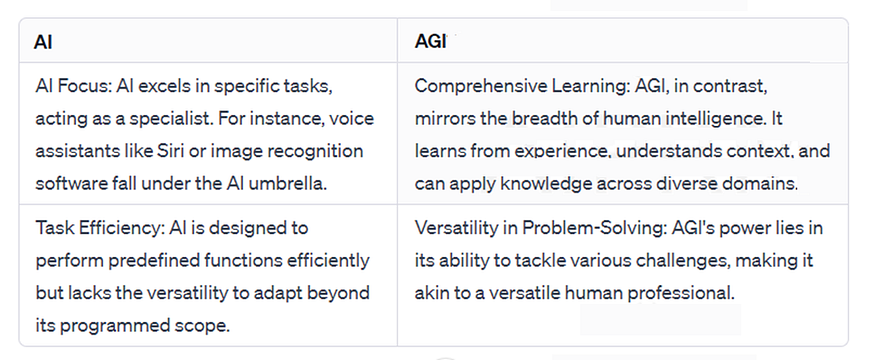The AI Discovery That Could Threaten Humanity

The Q*Project: An AI Beyond Human Intelligence
Are we ready for some Sci-Fi Drama?
Despite the controversy surrounding the project, OpenAI is forging ahead to create an AI system that surpasses human intelligence and inspires us all to reach new heights.
OpenAI’s Project Q* AGI is pushing the boundaries of what’s possible in the world of artificial intelligence. This innovative AI model is bringing us closer than ever to achieving artificial general intelligence, which has the potential to revolutionize industries and solve complex problems. With the ability to learn from any data source and generate text, images, and sounds based on its own goals and preferences, AGI has the power to introduce innovation on a grand scale.
What Is the Difference Between Normal AI and AGI?
AI and AGI are different in their capabilities. AI specializes in specific tasks, while AGI mirrors human intelligence, learning from experience and applying knowledge across diverse domains. AI automates specific processes, enhancing efficiency within defined parameters. AGI has the potential to revolutionize entire industries. Understanding these distinctions is vital as we integrate these technologies into our daily lives.

Practical Examples:
- AI Example: Consider a weather forecasting AI. It processes historical data and provides accurate predictions but cannot seamlessly transition to analyzing medical records.
- AGI Example: Imagine an AGI system assisting in healthcare. It could analyze medical records, understand patient history, and recommend personalized treatment plans, showcasing adaptability across various domains.
The Human-Like Element:
- Cognitive Resemblance: AGI aims to simulate human cognitive functions. While AI may accomplish tasks faster, AGI emulates human-like thinking, reasoning, and problem-solving.
- Continuous Learning: AGI evolves, continually learning and adapting to new information like a human mind.
The Controversy Surrounding Q*
There’s a big debate happening in the AI community about Q*. Some people who work at OpenAI think that Q* could be a major breakthrough in AI. It could help create brilliant machines that can do things better than humans. They believe this would lead to many great things for society and science.
But not everyone agrees. Some people think that Q* could be dangerous. They’re worried that it could be used in evil ways like to trick people or do harmful things. This debate intensified in November 2023 when a group of OpenAI researchers sent a letter to their bosses. The letter warned that Q* could be very dangerous.
Altman’s Turbulent Journey
The conflict within OpenAI resulted in the removal of CEO Sam Altman, who was a strong advocate for Q*. However, he was later reinstated due to opposition from staff and the public. Altman’s experience highlights the challenges and difficult decisions that OpenAI must confront to achieve its ambitious goals.
Ethical Concerns and Board Disputes
Project Q* faced internal disputes when OpenAI researchers raised concerns about the ethical implications of developing AGI. The potential for AGI to outperform humans raises ethical questions about its impact on job security and broader societal implications. As a result of these concerns, Altman was temporarily ousted.
Should We Be Concerned About AGI and Project Q*?
As an organization, OpenAI is a firm believer in the potential benefits of Artificial General Intelligence (AGI). However, there are growing concerns about the rapid development of the technology without a complete understanding of its consequences. The recent remarks by OpenAI’s CEO, Sam Altman, comparing AGI to a “median human” have sparked controversy and raised ethical concerns among AI researchers, who fear the possible negative outcomes that could arise from the creation of AGI.
In conclusion, OpenAI’s super-secret Project Q* remains shrouded in mystery. It can potentially revolutionize technology by creating AI that approaches human thinking. Still, concerns about the existential risk of surpassing human intelligence persist.
Comments
Post a Comment